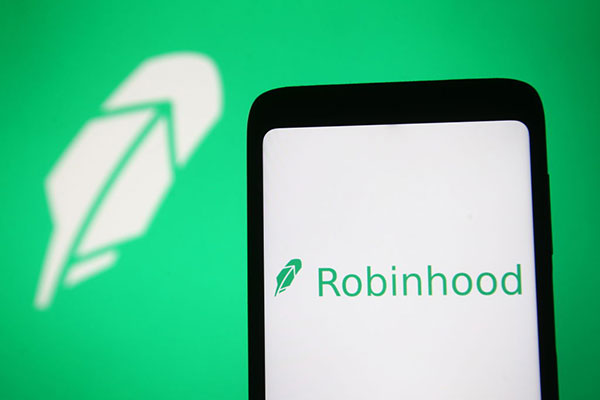Robinhood IPO: everything you need to know
28th July 2021 13:44
by Graeme Evans from interactive investor
With another massive US company floating its shares on the stock market, we examine the business and interest for UK investors.

The levelling of the IPO playing field in favour of retail investors continues tomorrow when financial trading app Robinhood makes its $32 billion* stock market debut.
As well as being another multi-billion-dollar high-growth Wall Street flotation, the listing is interesting because Robinhood is setting aside up to 35% of the 55 million shares in the offer for its own customers.
Robinhood is the latest tech firm to take a different approach to the initial public offering (IPO) process that's traditionally dominated by the big institutions at the expense of retail investors.
Earlier this month, money transfer business Wise (LSE:WISE) opted to go down the direct listing route, meaning its valuation was based on demand in the opening auction on the first day of trading, rather than being set beforehand by banks through the IPO bookbuilding process.
- How to buy Robinhood shares with ii
- Jargon buster: stock market flotations (IPOs)
- Small shareholders want a seat at the table as IPO listings take off
- Seven IPOs to watch out for during the rest of 2021
Wise, which has traded strongly since its debut, said it was a “fairer, cheaper and more transparent way” to broaden its ownership.Robinhood has a similar ambition with its IPO, one in keeping with its wider business mission about democratising finance.
It's even shaken up the traditional pre-IPO roadshow process, normally an activity that’s reserved for institutional investors and financial insiders. Robinhood's livestream event on Saturday featured a presentation from chief executive and co-founder Vlad Tenev and was followed by a live Q&A where directors answered questions submitted by the public.
With such a big chunk of shares set to be allocated to retail investors through a random ballot, there have been warnings that tomorrow's debut session on Nasdaq could be volatile.
Many of Robinhood's customers are novice investors, which increases uncertainty about how the listing will play out compared with the usual aftermarket process involving institutions and their traditionally high net wealth clients.
Some on Wall Street are forecasting a “meme bump” in keeping with events earlier this year, when Robinhood was at the heart of a social media-fuelled surge in trading that ignited the valuations of GameStop (NYSE:GME) and other heavily shorted stocks, including theatre business AMC Entertainment (NYSE:AMC).
The mania led to a four-fold jump in the company's revenues in the first quarter of the year, although it came at a price when it had to raise additional funds to meet the capital demands resulting from the surge in retail trading.
- AMC Entertainment: what could happen to this volatile Reddit stock
- Bill Ackman: what I think of GameStop and shareholder activism
- A risky investing craze: GameStop’s most volatile day
- The IPO market in 2021 so far: winners and losers
Robinhood's commission-free trades have attracted a younger generation of amateur investor during the pandemic, resulting in it having 18 million funded accounts at the end of March. It made over 80% of its March quarter revenues of $522 million through “payment for order flow” where it receives a small fee every time a trade is outsourced through another company.
The practice has raised questions about best execution on trades and comes amid heightened scrutiny of the issue by the US Securities and Exchange Commission.
Tenev and co-founder Baiju Bhatt got the idea for their business after discovering that big Wall Street firms were paying next-to-nothing to trade stocks, while most Americans were charged commission for every single trade.
Their mission after returning to California was to build a financial product that would give everyone access to financial markets, rather than just the wealthy.
The university roommates are selling shares in the IPO, but will retain considerable voting power based on expectations that Bhatt will have 39% of stock and Tenev 26.2%. The listing on Nasdaq takes place under the symbol Hood.
interactive investor customers can get involved once trading starts on Thursday afternoon (UK time).
- UK’s IPO boom is best in a decade
- AIM IPO winners and losers in 2021
- Take control of your retirement planning with our award-winning, low-cost Self-Invested Personal Pension (SIPP)
* Late on Wednesday, Robinhood priced its shares at $38 each, valuing the business at just under $32 billion. That’s right at the bottom of the previously announced range of $38-$42 a share.
These articles are provided for information purposes only. Occasionally, an opinion about whether to buy or sell a specific investment may be provided by third parties. The content is not intended to be a personal recommendation to buy or sell any financial instrument or product, or to adopt any investment strategy as it is not provided based on an assessment of your investing knowledge and experience, your financial situation or your investment objectives. The value of your investments, and the income derived from them, may go down as well as up. You may not get back all the money that you invest. The investments referred to in this article may not be suitable for all investors, and if in doubt, an investor should seek advice from a qualified investment adviser.
Full performance can be found on the company or index summary page on the interactive investor website. Simply click on the company's or index name highlighted in the article.